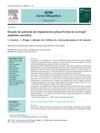A Syndromic Extreme Insulin Resistance Caused by Biallelic POC1A Mutations in Exon 10
August 2017
in “
European journal of endocrinology
”
TLDR Mutations in the POC1A gene can cause a unique form of extreme insulin resistance and short stature.
In 2017, researchers identified a homozygous frameshift mutation in the POC1A gene, specifically a duplication in exon 10, in a patient with short stature, facial hirsutism, alopecia, dyslipidemia, and extreme insulin resistance. This mutation led to a truncated protein affecting centriole assembly and ciliogenesis. The patient's symptoms were somewhat different from those of SOFT syndrome, which is also caused by biallelic loss-of-function mutations in POC1A, suggesting that mutations in exon 10 may lead to a distinct clinical condition. This case, along with a previous similar case, highlights the clinical heterogeneity that can result from alternative transcript processing of genes. The study suggests that POC1A mutations in exon 10 should be considered in patients presenting with extreme insulin resistance and short stature.




